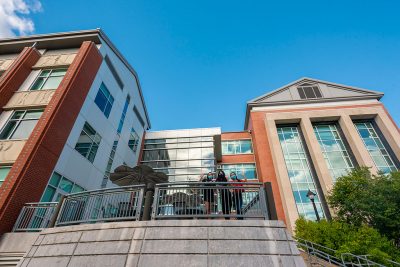CT Post (Sandra Chafouleas is quoted on student well-being assessments in Connecticut)
Parents Fighting, Teachers Crying: Grownup Stress Hits Kids Hard
The Hechinger Report (Lisa Sanetti quoted)
Scholars Show How to Challenge Voucher Discrimination
School Matters (Preston Green quoted and his recent article featured)
Educators Statewide Hope to Meet Needs of All Students, Discuss What Needs to Change Post Covid
Bristol Press (Jason Irizarry is quoted from an education panel)
Neag School Ranks Among Top 20 Publics for Sixth Consecutive Year

U.S. News & World Report Issues 2022 Rankings
For the sixth consecutive year, U.S. News & World Report has ranked UConn’s Neag School of Education among the top 20 public graduate schools of education in the nation. The 2022 rankings for best education schools were released today.
The Neag School stands at No. 16 among public graduate schools of education and at No. 27 for all graduate schools of education nationwide. In addition, one of the Neag School’s specialty programs stands among the top 20 in the United States: Special Education, tied at No. 13.
“Carrying out our mission-driven work at UConn’s Neag School relies on and undeniably benefits from the innovation and diligence of our faculty and staff, as well as the tremendous students here who aspire to shape the future of education,” says Interim Dean Jason Irizarry. “It’s always gratifying to see their hard work and brilliance reflected back and aligning with our own vision and values.”
“Carrying out our mission-driven work at UConn’s Neag School relies on … the innovation and diligence of our faculty and staff, as well as the tremendous students here who aspire to shape the future of education. It’s always gratifying to see their hard work and brilliance reflected back.”
— Jason Irizarry, Interim Dean
The U.S. News graduate education program rankings are based on statistical and reputation data based on 10 measures, including research activity, student selectivity, and peer assessments. For the 2022 rankings, U.S. News surveyed graduate education programs at 438 schools granting doctoral degrees in the fall of 2020 and early 2021, with 277 of those schools responding.
Specialty program rankings, such as those for special education, are based solely on nominations by education school deans and education school deans of graduate studies from the list of schools surveyed.
View the complete 2022 U.S. News & World Report Best Education Schools rankings.
State Considers Not Using Student Test Results to Judge Teachers’ Work For Three Years
CT Post (Morgaen Donaldson is interviewed about teacher evaluations)
Lisa Wolak Named Schools Superintendent
Weston Today (Neag School alumna Lisa Wolak was named superintendent of Weston Public Schools)
Windsor High School Principal Uyi Osunde Named Superintendent in Stratford
Hartford Courant (Neag School alumnus and former UConn football player Uyi Osunde has been named Stratford Public School’s superintendent)
Unprecedented Federal Funding Is on the Way. High-Poverty Schools Are Starting to Reckon With How to Spend It.
Chalkbeat (Preston Green is quoted on school funding)
How the Pandemic Has Tipped the Balance Between Work and Motherhood
WBUR Radio Boston (Jennie Weiner is interviewed about balancing work and motherhood during the pandemic)
